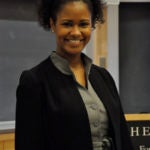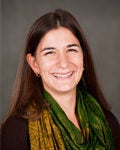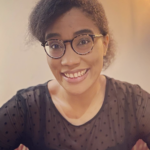Faculty-in-Residence
The Faculty-in-Residence (FIR) program enables seven faculty members, and their families, to live and interact with students while residing in an apartment within our residential buildings. FIRs work in close partnership with the Residential Living team to enhance the intellectual environment, support academic excellence and existing Living Learning Communities, provide opportunities for other faculty to interact with students, and engage in the day-to-day life of the residential community.
Faculty members also gain a deeper understanding of what the college experience is like for on-campus residents, which in turn provides a new perspective on how to approach teaching and learning within, and outside, the classroom environment.
7
Faculty-in-Residence
366
FIR events coordinated during an academic year
4808
students attended FIR events during an academic year
The FIRs averaged 60 events each per year with an average of 801 contact points with students. This number doesn’t include their teaching, research, committee work or other student interactions!
FIRs build relationships with residential students, provide resources and collaborate with the residential living team. FIRs are often involved in events across campus and can be found participating in, or attending lectures, sporting events, discussion groups, theatre productions, and student group meetings.
“I have really enjoyed the community at Arrupe Hall, and my favorite activities including hosting small group discussions on social justice issues…“
—M. Chatelain, Arrupe Hall FIR
“Whenever possible I love to take advantage of using my home for a convening space for the courses I teach… It completely changed the character of the class, in wonderful ways…There was greater comfort, vulnerability, respect, etc.”
—T. Howard, Kennedy Hall FIR
“…My FIR project has been to focus on urgent moral problems in the world and domestic politics.”
—M. McMorrow, McCarthy Hall FIR
“This year as a Faculty-in-Residence provided many exciting opportunities for growth and learning… I hosted discussions prompted by or co-lead with student organizations including but not limited to, the NAACP, GU Men and Women for Christ, the Patrick Healy Fellows, the Black Student Alliance…”
—S. Colbert, East Campus FIR
Current Faculty-in-Residence

Soycia Colbert: East Campus
Soyica Colbert is the Chair of the Department of Performing Arts, Director of Theater and Performance Studies and an Associate Professor of African American Studies and Theater and Performance Studies at Georgetown University. She is the author of The African American Theatrical Body: Reception, Performance and the Stage (Cambridge University Press, 2011) and Black Movements: Performance and Cultural Politics (Rutgers University Press, forthcoming 2017). Colbert edited the Black Performance special issue of African American Review (2012) and co-edited The Psychic Hold of Slavery (Rutgers University Press, 2016). She is currently working on two book projects, Lorraine Hansberry: Artist/Activist and Performing Seeing: Blackness in Visual Culture and Performance Theory. Colbert has published articles and reviews on Lorraine Hansberry, James Baldwin, Alice Childress, Toni Morrison, August Wilson, Lynn Nottage, Katori Hall, Ntozake Shange, Suzan-Lori Parks, Spike Lee, Kanye West, and Beyoncé Knowles in African American Review, Theater Journal, Boundary 2, South Atlantic Quarterly, Scholar and Feminist Online, and Theater Topics and in the collections Black Performance Theory, Contemporary African American Women Playwrights, and August Wilson: Completing the Cycle. She is the recipient of the Schomburg Scholars-in-Residence Fellowship, Woodrow Wilson Foundation Career Enhancement Fellowship, Stanford Humanities Postdoctoral Fellowship, Mellon Summer Research Grant, and the Robert W. Woodruff Library Fellowship. Her research interests span the 19th-21st centuries, from Harriet Tubman to Beyoncé, and from poetics to performance. She is an avid reader and lover of the arts. She resides in LXR with her husband, Rodger Colbert.

Dr. Elizabeth Grimm (G ’10): McCarthy Hall
Professor Elizabeth Grimm is a Professor of Teaching in the School of Foreign Service at Georgetown. Dr. Grimm is the co-author of the 2022 book Terror in Transition: Leadership and Succession in Terrorist Organizations from Columbia University Press and the 2017 book Lawyers, Policy Makers, and Norms in the Debate on Torture, also from Columbia University Press.
She was presented with the Dorothy Brown Award in 2012 by the Georgetown University Student Association on behalf of the undergraduate student body and has also received the School of Foreign Service Faculty of the Year Award in 2012, 2020, and 2023. Grimm is also the 2020 recipient of the James S. Ruby Faculty Appreciation Award from the Georgetown Alumni Association and the 2022 recipient of the 1820 Graduate Award from the Georgetown Alumni Association.
She received her Ph.D. in Government from Georgetown University, M.A. in Security Policy Studies from the George Washington University, and B.A. in Government and History from The College of William & Mary. Grimm has also worked in the defense and security sectors of the U.S. government.
She lives in McCarthy with her husband Jacques (C’01, G’07), their three children, Hugo, André, and Lulu, and their three-legged dog, Crouton.

Andrea M. Headley: Capitol Campus
Andrea M. Headley is an Assistant Professor at the McCourt School of Public Policy at Georgetown University. She is a scholar of public management, racial equity, and criminal justice policy. At the heart of research lies the question how can we create a more effective and equitable criminal justice system?
Dr. Headley’s research focuses on policing to understand how organizational, managerial, and individual level factors affect service delivery and outcomes, with a keen focus on inequities and disparities. Specific examples of her past work include improving police-community relations in communities of color, assessing the effect of race during use of force encounters, evaluating body-worn cameras, understanding national police reform commissions, analyzing dispositional outcomes in citizen complaints, and exploring the gendered norms and cultures in policing. Professor Headley enjoys working directly with public sector organizations to conduct both applied and engaged research to improve service delivery and racial equity.
She received her PhD in Public Affairs from the Department of Public Policy and Administration and an MS in Criminal Justice from Florida International University. She holds a BS Ed. in Community and Program Development as well as Criminology from the University of Miami.

Jennifer Boum Make: Kennedy Hall
Jennifer Boum Make is primarily a literary and visual studies scholar. She is an Assistant Professor in the Department of French & Francophone Studies and is affiliated with the African Studies Program at Georgetown University. She is currently the faculty in residence in Kennedy Hall, where she lives with her partner, Leanne Doughty, an Assistant Teaching Professor of Physics at GU as
well. Jennifer and Leanne are both from Europe, from France and Ireland respectively.
Jennifer’s research is focused on the French Caribbean, the legacy of colonialism and the French Atlantic slave trade, and care studies. She is currently developing a monograph entitled, Decolonial Care: Reimagining Caregiving from the French Caribbean. This project is a comprehensive exploration of the relationship between the legacies of colonialism and the dynamics of caregiving that have emerged from the French Caribbean. Her next project develops a gendered perspective on the impact of (neo-)colonial pollution (nuclear and chlordecone contamination) in a cross-study of
literary and visual representations of breast cancer and women’s breasts in French Caribbean and French Polynesian contexts. Jennifer is also co-editing a volume on graphic narratives of resistance in French with Edinburgh University Press.
Jennifer Boum Make is also an active member of the collective Kwazman Vwa, founded in the spring of 2021 and which offers series of monthly online conversations (during the academic year) with contemporary Caribbean writers.
At Kennedy, Jennifer and Leanne love to organize crafts circles and game nights, host breakfasts, and have just started a book club which will be moderated by colleagues at GU and students.

Amanda Phillips: Arrupe Hall
Amanda Phillips (they/he/she) is Associate Professor of English, Film and Media Studies, Women’s and Gender Studies, and American Studies at Georgetown University. They currently serve as the faculty in residence of Pedro Arrupe, S.J. Residence Hall, where they live with their spouse, Shyama, and two dogs. Amanda is the author of Gamer Trouble: Feminist Confrontations in Digital Culture, as well as co-editor of the Queer/Trans/Digital book series with NYU Press.
Amanda teaches and writes about video games, culture, and politics, with a particular emphasis on centering the insights of queer women of color feminism in the study of technology. Their interests more broadly are in issues of racial and gender justice in and around technoculture, popular media, and the digital humanities. Amanda is a butch/transmasculine, Latinx, first-generation college graduate.

Alexandra DeCandia: Copley Hall
Alexandra DeCandia is an Assistant Teaching Professor in the Biology Department, where she specializes in ecology and evolutionary biology. In the classroom, she teaches first year through graduate-level courses, including Principles and Practice in Biology (BIOL-1200), Foundations in Biology II (BIOL-1214), Ecology (BIOL-1800), Evolution of Mammalian Diversity (BIOL-4500), and Microbiome Pop-Up Labs (BIOL-4948/9). Dr. DeCandia additionally works as a Research Associate at Smithsonian’s National Zoo and Conservation Biology Institute, where she studies the impact of host-associated microbiomes on wildlife health in captivity (e.g., endangered black-footed ferrets) and the wild (e.g., Channel Island foxes and island spotted skunks). She also collaborates with local organizations to study environmental microbiomes in human modified landscapes. Through this work, Dr. DeCandia mentors undergraduate researchers in the Regents STEM Scholars Program and the Biology Department’s Research Intensive Senior Experience.
Dr. DeCandia received her Ph.D. and M.A. in Ecology and Evolutionary Biology from Princeton University, and her B.A. in Environmental Biology from Columbia University. She completed a post-doctoral research fellowship at the Center for Conservation Genomics at Smithsonian’s National Zoo and Conservation Biology Institute before joining Georgetown’s faculty in August 2021.
Outside of her academic pursuits, Dr. DeCandia loves to explore new places (particularly National Parks!), visit family members in New Jersey and Pennsylvania, and engage with Christian community through The District Church, where she serves as a middle and high school ministry volunteer. She lives in Copley Hall with her husband Dr. Edward Schrom and their dog- in-residence Stella.

Dr. Guy Spielmann: Reynolds Hall
Born in Marseille, France, Guy Spielmann (Ph.D. Vanderbilt University) is associate Professor of French in Georgetown College. He teaches courses—most usually in French—in performing arts as well as linguistics. While he joined the Georgetown faculty in 1994, he has also held visiting positions in various institutions in France (the Department of Drama at the Université Marc Bloch/Strasbourg II (2001-2003), the Department of Performing Arts at the Université Paris X-Nanterre (2001), and lately (2011-12) in the Department of Performing Arts and Literature at the Université Stendhal-Grenoble III).
His scholarly interests cover Early-Modern European performing arts broadly conceived, with a particular focus on stagecraft and non-literary genres (such as fairground theater and commedia dell’arte), as well as various forms of popular culture, notably film and comics. He is currently completing a comprehensive theoretical work on a possible “science of spectacle” under the working title, Spectacle Events.
Guy likes to mix text-driven research and stage production experience, and founded a theater group in 2002, La Compagnie SapassoussakasS, in order to put on shows and direct workshops—so far he has led groups of amateur and professional actors in the U.S.A., Québec, France, Tunisia, Morocco, the UK, Spain and Switzerland. His specialty is a kind of farcical, absurdist French drama from the 18th century (known as “Parade”), which he helped revive; in 2007, he took a group of Georgetown Undergrads to a theater festival in Montreal, where they performed some of these plays.
An early adopter of communication technology, he was among the first Georgetown faculty members to set up his own web pages, and later created a virtual resource Early-Modern European performing arts, OPSIS – Spectacles du Grand Siècle.
Other than traveling, lecturing and putting on shows, Guy loves to haunt museums and monuments of all kinds, to attend plays, operas and rock concerts, but he also enjoys cooking, spending time in gardens (though he can never remember the names of flowers), and discussing underground cinema from the 60s and 70s.
In August 2012, he begins a residency in Reynolds Hall as adviser of the Culture & Performance Living Learning Community (CPLLC), and will be directing a new drama workshop in the French department in the Fall.
